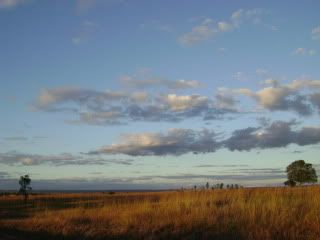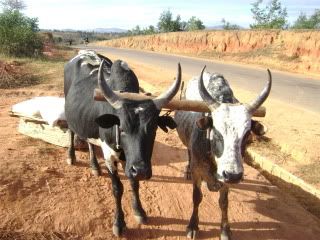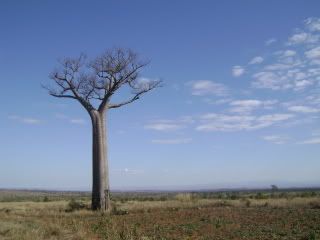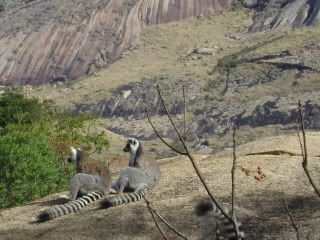The country is dotted with little villages which seem to have been airlifted, albeit with a few changes, from the European countryside. Restaurants serve steak au poivre vert (featuring fresh green peppercorns) for 4 dollars while roadside cafes have fresh baguettes and croissants as well as perfect little cups of cafe au lait.

The island of Madagascar was set adrift from mainland Africa 165 million years ago and since then its strange cargo of plants and animals have been evolving into weird and wonderful shapes ever since. The signature animal is the lemur, a sort of cross between a monkey and a rat which lives in families and holds hands and seems to hug its mates. The signature tree is the baobab, a startling monument to strangeness which seems to piece the sky. And much of the countryside is a jumble of granite domes and spires which have to be seen to be believed.

The gems of Madagascar are its national parks, and there are a lot of them filled to overflowing with forest and animals. We are here in late autumn; the weather is sublime. The people are proud of the country and its assets, and proud that you are there visiting. They are protective of tourists and rarely hassle you.
We arrived in Madagascar's strange French-influenced capital, Antananarivo, on an incredible sunny Saturday. We had great food, walked the cobbled streets, dozed about a bit, then got down to business.

Transport in Madagascar is fairly diabolical, so we did something we have never done before: we hired a guide and driver. Germain showed up at our hotel smartly dressed and with a smoke-belching LandCruiser. Between his English and my French we could sort of communicate. We toured south through Parc Nacional Ranomafina where we saw the elusive bamboo lemur. We visited Anja, a community preserve home to a remarkable nearly tame family of ringtail lemurs. We hiked through the immense open spaces and sunstarved slotcanyons of Parc Nacional Isola. We wandered through a loose forest of baobab trees tailed by curious village children who whispered 'bonbons, monsieur, s'il vous plait.' We ate steaks in small village restaurants and drank sumptuous cafe au lait with our petite dejeuner (ok, so the petite dejeuner, France's idea of the way to start the day; is really just a piece of stale bread and the aforementionned coffee). We had a very, very, very nice time.
For the most part, I mean.
Like many of the world's beautiful places, Madagascar is also heartbreaking and tragic. At times the country seems to be sagging under the weight of its own poverty, corruption and stupidity. After traveling the past 15 years to some 80 countries sometimes I have begun to think that nothing is shocking. In Madagascar, however, nearly everything is shocking. I could entertain (or sicken) you for hours with the most amawing and unlikely of stories. Here's one: we are in a bus where the gas tank has been removed and replaced with a bucket which sits next to the driver's foot; a hose snakes from the engine through a hole in the dash to the bucket, which is sloshing as we race around mountain curves. Not a big deal, except all four people in the front seat insist on smoking.

The tragedy of the country is its poverty, which is grinding, even when seen in the broader context of Africa. Such little stories like the smoking gas tank are a symbol of the country at large; the fact that such things exist in a country so beautiful seems to make it all the more appalling. What I have been trying to figure out is wether Madagascar is beatiful in spite of its poverty or perhaps because of it.
Like so many other countries we have visited on this trip, Madagascar has seen more than its share of political problems. Long suffereing from inept goverments, the country finally seemed to get a decent president a few years ago. Unfortunately, residents of the major metro areas did not see it that way and this spring took to the streets. The several-week-long war saw the ruling president flee and the upstart hopeful take power. The well publicized event featured rioting and civilian deaths. Predictably, the tourist economy, already weakened by a bad economy in Europe, burned to a crisp. I estimate that during our two weeks here tourist arrivals had slowed to a stunning two to three dozen a day ... and this during the height of the tourist season. In a country with poor education, no middle class and few opportunities for real advancement, association with the tourist trade is one of the few ways ordinary people in Madagascar can get ahead. Most of our time here, wether in hotels or parks or negotiating with guides, we have been the only tourists in sight.
Laura thinks the nexus of the country's problems is the lack of education among the vast majority of its residents. She's probably right, but I have to wonder how much the nation's colonial history has to do with it as well.
Madagascar was the domain of France from the mid 1800s to just before World War Two (in fact the country is still to a large degree trying to rid itself of its French heritage; the former president ordered that the new national language be English, not French). France has a long and storied history of colonialism in Africa, though excepting Madagascar all of its holdings were in West Africa. The history of colonialsim in Africa, and how colonialism ended, is complicated and open to multiple interpretations, but its fair to say that few former colonies in Africa have faired well. From my experience, those ruled by the English have fared better, especially if you look at examples like Kenya and Botswana. Those ruled by Portugal, meanwhile, have had the hardest go at things. None of them have fared as well as former colonies in places like Asia, where even the plight of a place like Laos looks enviable when put up against, say, Mocambique.
European countries seem, in my view, rather unwilling to make amends for the debts owed to their former charges, and debt is the only way to look at it. Countries like France and Belgium and England systemmatically raped Africa of its resources while installing puppet governments which were allowed to develop the largesse and corruption which rule today. One, I think, could forgiven for cynically supposing the French, seeing the number of espresso machines and the quality of the croissants here could sit back, smoke a Galouise, and say Mission Accomplished. It's by no means all France's problem, but their misdeeds on the continent seem to stand out the most illconceived.
(What the hell? Am I French bashing? What's next -- watching Fox News?)
OK, enough on France. Our last day in Isola I walked to the edge of town, trailed by the usual coterie of children, many of whom simpy wanted to touch my hair. The sky was wide and full of autumn. When the kids got bored and left me I could walk away into the countryside, the dry yellow grass whipping around my shins. We've spent most of the past halfyear in jungle and forest, where the horizon is just a few yards ahead. Here, I could see silent peaks 100 miles in the distance. Simply incredible, this place.
We head to Tunisia in 48 hours. Our trip is down to its final three weeks.
4 comments:
I just love you. Another brilliant update. How do you learn so much about the politics and history of a place?
We love you too. So glad that you got to Madagascar. Waynesville needs the Schmerkers back! Now!
We warned Laura not to ride busses with you! Madagascar sounds wonderful in an odd way and tragic in another. Can't wait for the full report. I was thinking of a song from my era, or even Gramps'. I think the title is September Song. One line is: "As the days dwindle down to a precious few..." I know you will make good use of each minute you still have to enjoy before you reach home.....
No, no! Don't stop the bashing. You're a reporter, aren't you? Besides, you're not really bashing anyway, or at least any more than they deserve. We all owe a giant debt to Africa, don't we? And many of us appreciate you telling us why.
Another great post, Jeff. Thanks.
Post a Comment